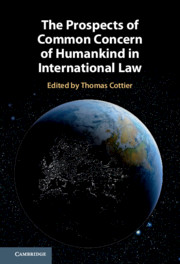Book contents
- The Prospects of Common Concern of Humankind in International Law
- The Prospects of Common Concern of Humankind in International Law
- Copyright page
- Contents
- Figures
- Contributors
- Preface
- Acknowledgements
- Abbreviations
- Part I Theory
- Part II Case Studies
- 2 Trade-Related Measures to Spread Low-Carbon Technologies
- 3 Marine Plastic Pollution as a Common Concern of Humankind
- 4 Exploring the Recognition of New Common Concerns of Humankind
- 5 Reshaping the Law of Economic Sanctions for Human Rights Enforcement
- 6 Migration as a Common Concern of Humankind
- 7 International Monetary Stability as a Common Concern of Humankind
- 8 Financial Stability as a Common Concern of Humankind
- Part III Epilogue
- Index
- References
5 - Reshaping the Law of Economic Sanctions for Human Rights Enforcement
The Potential of Common Concern of Humankind
from Part II - Case Studies
Published online by Cambridge University Press: 04 May 2021
- The Prospects of Common Concern of Humankind in International Law
- The Prospects of Common Concern of Humankind in International Law
- Copyright page
- Contents
- Figures
- Contributors
- Preface
- Acknowledgements
- Abbreviations
- Part I Theory
- Part II Case Studies
- 2 Trade-Related Measures to Spread Low-Carbon Technologies
- 3 Marine Plastic Pollution as a Common Concern of Humankind
- 4 Exploring the Recognition of New Common Concerns of Humankind
- 5 Reshaping the Law of Economic Sanctions for Human Rights Enforcement
- 6 Migration as a Common Concern of Humankind
- 7 International Monetary Stability as a Common Concern of Humankind
- 8 Financial Stability as a Common Concern of Humankind
- Part III Epilogue
- Index
- References
Summary
In this chapter, it is argued that the deficiencies of the international human rights regime pose a difficult dilemma for individual states – when and how to respond to egregious human rights violations abroad. Being constrained by a few possible alternatives, individual states or groups of states increasingly rely upon coercive economic measures (unilateral economic sanctions) to remedy grave human rights violations. The legality of unilateral economic sanctions has been debated at length within the international community. Notwithstanding this, their consistency with public international law and more specifically, WTO law is still contestable. Against this backdrop, the chapter discusses the theoretical framework of the doctrine of Common Concern and its potential to discipline the use of coercive economic measures imposed on human rights grounds. It explores the ability of the emerging doctrine to provide a new legal framework and necessary thresholds to legitimize coercive economic measures as well as to restrict their use if they are politically motivated.
Keywords
- Type
- Chapter
- Information
- Publisher: Cambridge University PressPrint publication year: 2021

